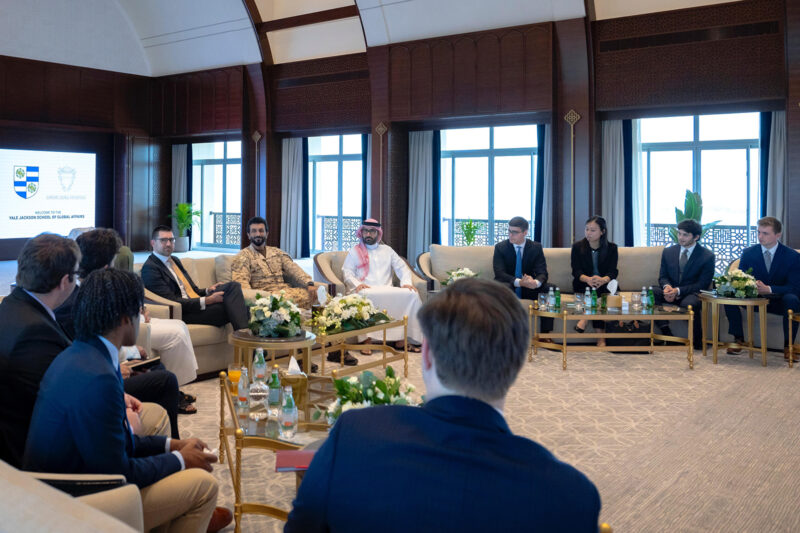In this blog, Yale Global Affairs majors Ari Nagle ’24 and Johannes Kretzler ’24 share their experiences from a trip to Bahrain and Qatar last fall as part of their senior capstone course.
As we sipped fresh watermelon juice in a cavernous room in the Royal Guard Palace in Manama, Bahrain, an unexpected figure entered the room to greet us: His Highness Sheikh Nasser bin Hamad Al Khalifa, the country’s national security advisor and a senior member of the royal family.
“Hello Yale students! When I heard your group wanted to talk tech cooperation, I wanted to hear from you directly,” he said, motioning for us to sit down for what turned into a nearly hour-long conversation on the future of the Middle East. (We had been expecting to meet with his deputies.)
Later that day, the country’s national news agency published a story detailing our meeting. The session was another highlight in an action-packed week of meetings with top private and public sector officials in Bahrain and Qatar over Thanksgiving break.
Led by Roland McKay, a career U.S. Foreign Service Officer, our team of ten Yale College seniors is completing a project on emerging technologies in the Gulf region. The U.S. National Security Council staff is the main audience for our final report. In recent years, Gulf states have sought to diversify their economies beyond the hydrocarbon industries that have driven their prosperity for decades. Using their wealth, ambition and political agility, these countries have invested heavily in nascent technology sectors in pursuit of global tech leadership.
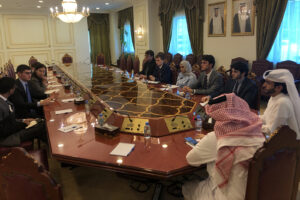
As Chinese investment and exports flow into the region, the U.S. is working to promote trusted technologies and telecommunications infrastructure while seeking to offer its support in the development of the Gulf region’s emerging tech sector. Tasked with integrating commerce policy, tech policy and foreign policy objectives into a single comprehensive framework for regional cooperation, we traveled to the Gulf with the goal of meeting with regional stakeholders to brainstorm ways of bringing Gulf countries into the U.S. tech ecosystem and improving U.S. tech cooperation more broadly. We focused particularly on next-generation telecommunication networks, cloud computing, semiconductor chips, and artificial intelligence.
Following our departure from the Royal Guard headquarters, we visited the U.S. Embassy in Manama to hear from Ambassador Steven Bondy and the embassy’s “country team” — the heads of the various sections and agencies that make up U.S. posts overseas — who outlined the primary foreign policy objectives for the U.S. in Bahrain. We then traveled back across the country, passing oil fields and colossal aluminum refineries, arriving at the Nasser Vocational Training Center to meet with Bahrain’s AI Society. A primary promoter of artificial intelligence in the region, the AI Society has executed several AI projects for various Bahraini government ministries. Our host was able to provide insight into how the nation expects to expand its AI capabilities and gaps the U.S. may be able to help fill in the process.
The next day began with a meeting at the offices of Batelco, Bahrain’s leading telecommunications provider. Our host offered historical context on telecommunications in the country before presenting on the equipment providers that Batelco currently uses to operate its networks. He also explained the company’s vision for the future of telecommunications in the region, including challenges it has faced in implementing open radio access networks — a more secure and accessible alternative to the radio access networks that currently comprise telecommunication networks around the world.
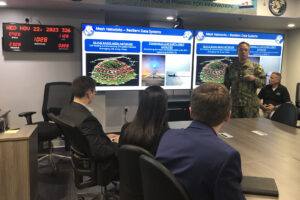
Next, we met with Bahrain’s Economic Development Board, which called our attention to the successful establishment of regional hubs by Amazon Web Services and Citibank in the country, before pointing out some of the obstacles the country continues to face in attracting foreign investment. We then met with Bahrain’s Information and eGovernment Authority and visited the U.S. Free Trade Zone — reclaimed land that the Bahraini government has set aside for the development and tax-free operation of American companies.
His Excellency Sheikh Salman bin Khalifa Al Khalifa, the Bahrani Finance Minister, then hosted us at Al-Qudaibiya Palace, a carefully landscaped estate and government building in the center of Manama. We floated some of our initial framework ideas with Sheikh Salman, who then showed us a central control room where the prime minister’s office tracks citizen complaints submitted through an online app.
On our final day in Bahrain, we spent time at U.S. Naval Support Activity Bahrain, home to the U.S. Naval Forces Central Command and the U.S. Navy’s Fifth Fleet — one of only three American naval fleets headquartered outside of the U.S. After being welcomed by the base’s chief of staff, we visited Task Force 59 to learn how emerging technologies support the Navy’s operations in the Gulf. We then toured the base’s docking area and were briefed on the various types of naval drones being developed and deployed from the base.
We concluded with a session at the base’s minesweeping center, where we were hosted by the leader of the team that recovered the debris from the Chinese surveillance balloon downed off the coast of South Carolina in early 2023. After our visit to the naval base, we were driven to Manama’s recently expanded international airport, where we thanked our drivers and said goodbye to Dabia, the Foreign Ministry protocol official who had kindly put together our entire itinerary. We landed in Doha, Qatar, after sunset, welcomed by the city’s brightly illuminated skyline.
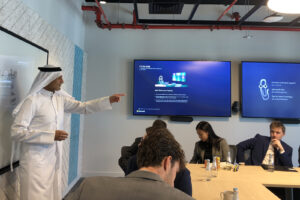
Following our first Qatari hotel breakfast, we departed for the Burj Alfardan in Lusail, home to Microsoft Qatar’s headquarters. Like many of the developments in Lusail, it was completed within the last five years. Looking out from the high rise’s panoramic windows, our host pointed out the 2022 FIFA World Cup stadiums that dotted the horizon. We were then introduced to Eng. Khalid Sadiq Al Hashmi, one of the country’s top cyber officials based at the Qatari Ministry of Communications and Information Technology. We gathered in a meeting room to discuss how the growth of Qatar’s private technology sector is taking a leading role in diversifying the country’s economy.
After a short drive back to Doha, we arrived at Qatar’s Ministry of Foreign Affairs, where we met with Dr. Majed Al-Ansari, the ministry’s spokesperson. He offered a candid perspective on U.S.-Qatar relations, emphasizing the need for more consistent and reciprocated relations between the two countries across all domains of diplomacy. He also explained Qatar’s motivation for becoming a mediator of conflicts between state and non-state actors, noting the importance of these negotiations in promoting peace. Shortly after our meeting concluded, Dr. Al-Ansari’s face flashed across news feeds around the world as he announced that a four-day ceasefire between Israel and Hamas had — with the help of Qatari mediation — been brokered in Doha.
After spending the next 24 hours exploring Qatar — visiting the Museum of Islamic Art, wandering the alleyways of Souq Waqif (a marketplace in the heart of Doha), and replacing a traditional Thanksgiving meal with an afternoon at a Levantine restaurant overlooking Doha — we departed for our last meeting of the trip. Gathered around a campfire in a farming oasis that interrupts the sandy deserts comprising much of central Qatar, we were once more greeted by Khalid Sadiq Al Hashmi, who introduced us to Sheikh Ali Alwaleed Al-Thani, the CEO of Qatar’s Investment Promotion Agency. Over a locally sourced dinner, we discussed how the U.S. can better facilitate investment in Qatar and support the region’s emerging technology sector, while also encouraging its use of trusted technologies and infrastructure in the process.
Embraced by the hospitality of our hosts in both Bahrain and Qatar, engaging with stakeholders on the ground in the Gulf proved to be invaluable, enabling honest conversations with regional leaders that will ensure the relevance, accuracy and impact of our work. Back in New Haven, we consolidated our findings in a final report that outlines a framework of requirements and incentives for stronger U.S.-Gulf cooperation in the development of a successful and secure emerging technology sector in the region. Our report has been shared with the regional stakeholders we met with.
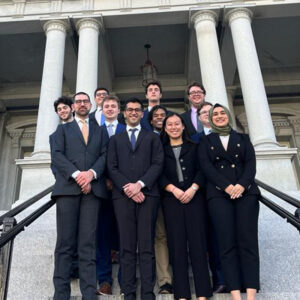
During our last week of the capstone course, we traveled to the White House to present our report to National Security Council staff officials, who pushed us on some of the details of our recommendations and challenged our assumptions while offering concrete feedback. It was a “trial by fire” in briefing complex topics to real-world policymakers who have to balance multiple priorities and competing geopolitical objectives.
Our capstone experience did not end on the last day of class, however. Demonstrating the impact our project is having in shaping a topic in foreign policy, we also had the chance to brief Nate Fick, the U.S. Ambassador at Large for Cyberspace and Digital Policy, who offered additional feedback, detailed his own team’s approach to the challenge, and told us our project “hit the nail on the head.”
